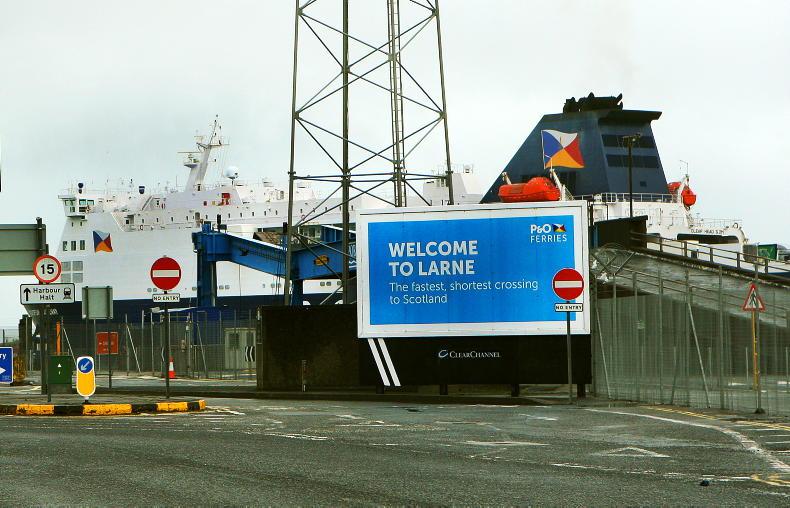The unilateral move by the UK to extend the grace period for goods shipped from Britain to Northern Ireland (NI) until 1 October will avoid the chaos that would likely have occurred at NI ports when the originally agreed grace period finished on 31 March.
However, by acting unilaterally, outside the mechanism of its agreement with the EU, the UK has caused consternation in Brussels, where deliberations are under way on how to react.
Both jurisdictions on the island of Ireland need to see a de-escalation of this row, as any imposition of sanctions will put Irish farmers' route to market in jeopardy.
Measured reaction
The move by the UK to disregard an agreed treaty for a second time in six months has not been well received in several EU member states.
Ireland is the most exposed country to any potential breakdown in the withdrawal agreement and would carry almost 20% of all tariffs, despite having just 5% of trade.
Remember that in a complete breakdown scenario, whereby the entire agreement collapses, 20 of the 27 EU member states would be mostly unaffected as those states conduct relatively little trade with the UK.
Disputes and diplomacy
Hopefully the disputes resolution mechanism in the Trade and Cooperation Agreement (TCA) between the EU and UK will work and a potential collapsed deal and WTO tariffs can be avoided.
The Irish Government has to use all its diplomacy to deliver a measured EU response that prevents a worse outcome, because the greater the divergence between the EU and UK, the greater the collateral damage for Ireland.

Distribution hubs in Britain need special arrangements to service their supermarkets in NI. This makes the extension necessary but by acting unilaterally it breaches the terms of the protocol \ Houston Green
UK government has a point on trade with NILooking at the UK's announcement to extend the grace period through an EU lens, it appears that the UK went off on a solo run in total disregard of the protocol agreed last December.
However, from the UK's perspective, even with the grace period, there have been plenty of problems operating under the protocol.
Apportioning blame is pointless – nothing will ever work as well as a single market, but had the grace period run out at the end of March there would have been complete chaos.
This, mixed with the political sensitivities of any border control functions being implemented on behalf of the EU at NI ports, is a worrying mix.
Announcing this extension to 1 October to enable a more functional control system to be developed averts such potential issues come April, though the UK went about it the wrong way.
Despite the annoyance caused in Brussels, it also hints that the UK government is looking at how to make the protocol work, rather than abandoning it as is demanded by Unionist politicians in NI.
Where next?
There will be a clamour from many in the EU, particularly countries that aren’t overly exposed, to hit back hard.
However, from the perspective of Irish farmers that rely on the British market, that would serve little commercial purpose and even risk making a bad situation worse.
What the Irish Government needs to do now is persuade the EU to have a measured engagement with the UK through the joint committee headed by David Frost and European Commission vice president Maros Šefcovic.
A token rebuke to the UK should be quickly followed by the agreement of a proper implementation period that facilitates trade both ways.
Irish farmers wait anxiously on Britain implementing veterinary certificates from 1 April on Irish beef, dairy and all products of animal and plant origin.
Meanwhile, industry representatives from all sectors of the British meat and fisheries industries spent several hours giving evidence to the Environment, Food and Rural Affairs Select Committee (EFRA) committee in Westminster on how impossible it has become to do business with the EU.
Breathing space
The solution that satisfies the needs of NI supermarkets and both British and Irish exporters is for the Joint Committee to agree a sufficient implementation period to enable trade to function.
This would effectively mean further extending the grace period UK Government has already announced.
It would then be important to use this period of time to explore to what extent the UK can align itself with EU veterinary standards.
Achieving complete alignment has widespread support in the farming and the agri food industries, and given that the UK is unlikely to diverge from EU standards in the immediate future, alignment – similar to how Switzerland and Norway operate – is the basis for a more settled trading position.
Irish exposure
Traders in the UK and EU hope that an outcome can be achieved that restores at least some of the functionality enjoyed when the UK was part of the EU. The EU prioritises protection of the single market, while for the UK the priority has always been sovereignty.
A perfect solution does not exist to cater to each of these three objectives, and the pursuit of perfection could lead to a breakdown in EU/UK relations.
It is worth recalling doctor Mike Ryan of the World Health Organisation’s comment at the outset of the COVID-19 pandemic that “perfection is the enemy of good” when it came to emergency responses. Perfection is also the enemy of good when it comes to the EU and UK creating the structure for a long-term, harmonious trading relationship.
Trade will never be as smooth as when the UK was part of the EU, but it needs to be manageable.
An agreement will require concessions from both sides – the EU allowing for an element of cherry picking by the UK, which in turn will have a little less than absolute sovereignty.
The consequences of not getting an agreement, even if it is less than perfect, are horrendous, especially for farmers on the island of Ireland.
The unilateral move by the UK to extend the grace period for goods shipped from Britain to Northern Ireland (NI) until 1 October will avoid the chaos that would likely have occurred at NI ports when the originally agreed grace period finished on 31 March.
However, by acting unilaterally, outside the mechanism of its agreement with the EU, the UK has caused consternation in Brussels, where deliberations are under way on how to react.
Both jurisdictions on the island of Ireland need to see a de-escalation of this row, as any imposition of sanctions will put Irish farmers' route to market in jeopardy.
Measured reaction
The move by the UK to disregard an agreed treaty for a second time in six months has not been well received in several EU member states.
Ireland is the most exposed country to any potential breakdown in the withdrawal agreement and would carry almost 20% of all tariffs, despite having just 5% of trade.
Remember that in a complete breakdown scenario, whereby the entire agreement collapses, 20 of the 27 EU member states would be mostly unaffected as those states conduct relatively little trade with the UK.
Disputes and diplomacy
Hopefully the disputes resolution mechanism in the Trade and Cooperation Agreement (TCA) between the EU and UK will work and a potential collapsed deal and WTO tariffs can be avoided.
The Irish Government has to use all its diplomacy to deliver a measured EU response that prevents a worse outcome, because the greater the divergence between the EU and UK, the greater the collateral damage for Ireland.

Distribution hubs in Britain need special arrangements to service their supermarkets in NI. This makes the extension necessary but by acting unilaterally it breaches the terms of the protocol \ Houston Green
UK government has a point on trade with NILooking at the UK's announcement to extend the grace period through an EU lens, it appears that the UK went off on a solo run in total disregard of the protocol agreed last December.
However, from the UK's perspective, even with the grace period, there have been plenty of problems operating under the protocol.
Apportioning blame is pointless – nothing will ever work as well as a single market, but had the grace period run out at the end of March there would have been complete chaos.
This, mixed with the political sensitivities of any border control functions being implemented on behalf of the EU at NI ports, is a worrying mix.
Announcing this extension to 1 October to enable a more functional control system to be developed averts such potential issues come April, though the UK went about it the wrong way.
Despite the annoyance caused in Brussels, it also hints that the UK government is looking at how to make the protocol work, rather than abandoning it as is demanded by Unionist politicians in NI.
Where next?
There will be a clamour from many in the EU, particularly countries that aren’t overly exposed, to hit back hard.
However, from the perspective of Irish farmers that rely on the British market, that would serve little commercial purpose and even risk making a bad situation worse.
What the Irish Government needs to do now is persuade the EU to have a measured engagement with the UK through the joint committee headed by David Frost and European Commission vice president Maros Šefcovic.
A token rebuke to the UK should be quickly followed by the agreement of a proper implementation period that facilitates trade both ways.
Irish farmers wait anxiously on Britain implementing veterinary certificates from 1 April on Irish beef, dairy and all products of animal and plant origin.
Meanwhile, industry representatives from all sectors of the British meat and fisheries industries spent several hours giving evidence to the Environment, Food and Rural Affairs Select Committee (EFRA) committee in Westminster on how impossible it has become to do business with the EU.
Breathing space
The solution that satisfies the needs of NI supermarkets and both British and Irish exporters is for the Joint Committee to agree a sufficient implementation period to enable trade to function.
This would effectively mean further extending the grace period UK Government has already announced.
It would then be important to use this period of time to explore to what extent the UK can align itself with EU veterinary standards.
Achieving complete alignment has widespread support in the farming and the agri food industries, and given that the UK is unlikely to diverge from EU standards in the immediate future, alignment – similar to how Switzerland and Norway operate – is the basis for a more settled trading position.
Irish exposure
Traders in the UK and EU hope that an outcome can be achieved that restores at least some of the functionality enjoyed when the UK was part of the EU. The EU prioritises protection of the single market, while for the UK the priority has always been sovereignty.
A perfect solution does not exist to cater to each of these three objectives, and the pursuit of perfection could lead to a breakdown in EU/UK relations.
It is worth recalling doctor Mike Ryan of the World Health Organisation’s comment at the outset of the COVID-19 pandemic that “perfection is the enemy of good” when it came to emergency responses. Perfection is also the enemy of good when it comes to the EU and UK creating the structure for a long-term, harmonious trading relationship.
Trade will never be as smooth as when the UK was part of the EU, but it needs to be manageable.
An agreement will require concessions from both sides – the EU allowing for an element of cherry picking by the UK, which in turn will have a little less than absolute sovereignty.
The consequences of not getting an agreement, even if it is less than perfect, are horrendous, especially for farmers on the island of Ireland.








 This is a subscriber-only article
This is a subscriber-only article










SHARING OPTIONS: